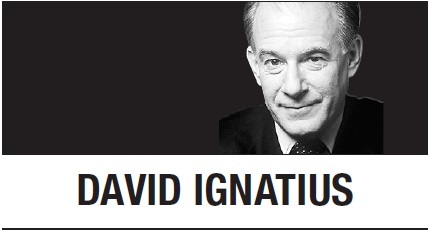
President Trump’s love-hate relationship with Britain has been on display in London this week. This ambivalence takes an especially bizarre turn in comments by the president and his supporters about British intelligence, historically America’s most important secret partner.
After bashing prominent British figures on his way to London, Trump was on good behavior Tuesday, after a glittering state dinner the night before with the queen. He paid ritual homage to the special alliance between Britain and America and the “love ... great love” showed him during his visit.
“We have an incredible intelligence relationship,” Trump told reporters, evoking the historic partnership between Britain’s Secret Intelligence Service (known as MI6) and the CIA, with departing Prime Minister Theresa May at his side.
At that, members of the British intelligence establishment must surely have rolled their eyes. Trump and his political allies have in fact been straining the covert alliance to the point that some insiders on both sides worry that trust and cooperation could eventually begin to erode.
The Trump camp’s suspicion about British intelligence is part of its counternarrative to the investigations of possible Trump campaign links with Russia. The centerpiece is the famous dossier -- compiled by former MI6 officer Christopher Steele -- which, it was hoped, would “come to light prior to Nov. 8” to defeat Trump, according to a recently declassified State Department memo. Trump’s supporters speculate further that Steele was aided by MI6 and GCHQ, the British signals-intelligence agency.
There’s no evidence of official British support for Steele, and US sources tell me that Mark Lyall Grant, then British national security adviser, disavowed Steele’s dossier in a January 2017 message to Trump’s advisers. But that didn’t stop Rep. Devin Nunes, R-California, the ranking member of the House Intelligence Committee, from sending Trump a letter May 22 urging him to ask the British prime minister “about the British government’s knowledge of the Steele dossier.”
Nunes fired a bulletpoint list of questions: “Did Christopher Steele inform any current or former British intelligence or government officials about the allegations he put forward in the Steele dossier? ... Is the British government aware of ... activities by any government to surveil or otherwise target active or former associates of the Trump campaign?”
If this paranoia about Britain sounds familiar, that’s because it has been gathering momentum for more than two years. Back in March 2017, Sean Spicer, then White House press secretary, floated a Fox News analyst’s unsubstantiated claim that GCHQ had helped spy on Trump during the campaign. The British spy agency dismissed the charge as “utterly ridiculous.”
This April, the GCHQ allegation was back. One America News Network repeated the claim, and Trump tweeted: “WOW! It is now just a question of time before the truth comes out, and when it does, it will be a beauty!” GCHQ reiterated its earlier statement that the allegation was “nonsense ... and should be ignored.”
Nunes, too, has been pushing the Anglo-America button for many months. Last August, he even traveled to London hoping to meet the heads of MI5, MI6 and GCHQ. They wouldn’t see him. Nunes now appears to have an ally in Attorney General William Barr, who has launched an investigation of alleged spying into the Trump campaign, perhaps including highly sensitive intelligence-liaison files.
This Brit-bashing has had some effect. Former British officials believe that MI6 has begun to worry about sharing its most sensitive secrets with the United States, for fear that they may be disclosed by the Trump White House for political reasons, or through simple carelessness. This British concern about US ability to keep secrets predates Trump, but it has increased.
“You never know what Trump will say or do or tell in a rage, and that’s something to worry about,” says a former British official. “The US has become a less reliable ally.”
Rep. Adam Schiff, D-California, who now chairs the House Intelligence Committee, told me he’s confident the special intelligence relationship “will survive Donald Trump,” thanks to professionals on both sides. He says he has urged British officials to maintain the unique partnership, but he cautions: “There’s nothing I can say that will disabuse them of concern about what this president might do with information that could be damaging to them.”
The idea of an Anglo-American conspiracy that secretly runs the world is hardly new among fringe groups, left and right, but it gets an odd boost from this president. Britain is the club that Trump desperately wants to join but simultaneously resents. He’s the “America First” populist who this week exalted in being received by British royalty.
David Ignatius---
Follow David Ignatius on Twitter: @IgnatiusPost -- Ed.
(Washington Post Writers Group)







![[Weekender] Korea's traditional sauce culture gains global recognition](http://res.heraldm.com/phpwas/restmb_idxmake.php?idx=644&simg=/content/image/2024/11/21/20241121050153_0.jpg)
